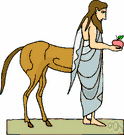myth
Also found in: Thesaurus, Medical, Acronyms, Idioms, Encyclopedia, Wikipedia.
Related to myth: Greek myth
myth
(mĭth)n.
1.
a. A traditional, typically ancient story dealing with supernatural beings, ancestors, or heroes that serves as a fundamental type in the worldview of a people, as by explaining aspects of the natural world or delineating the psychology, customs, or ideals of society: the myth of Eros and Psyche; a creation myth.
b. Such stories considered as a group: the realm of myth.
2. A popular belief or story that has become associated with a person, institution, or occurrence, especially one considered to illustrate a cultural ideal: a star whose fame turned her into a myth; the pioneer myth of suburbia.
3. A fiction or half-truth, especially one that forms part of an ideology.
4. A fictitious story, person, or thing: "German artillery superiority on the Western Front was a myth" (Leon Wolff).
[New Latin mȳthus, from Late Latin mȳthos, from Greek mūthos.]
American Heritage® Dictionary of the English Language, Fifth Edition. Copyright © 2016 by Houghton Mifflin Harcourt Publishing Company. Published by Houghton Mifflin Harcourt Publishing Company. All rights reserved.
myth
(mɪθ)n
1. (Classical Myth & Legend)
a. a story about superhuman beings of an earlier age taken by preliterate society to be a true account, usually of how natural phenomena, social customs, etc, came into existence
2. a person or thing whose existence is fictional or unproven
3. (Literary & Literary Critical Terms) (in modern literature) a theme or character type embodying an idea: Hemingway's myth of the male hero.
4. (Philosophy) philosophy (esp in the writings of Plato) an allegory or parable
[C19: via Late Latin from Greek muthos fable, word]
Collins English Dictionary – Complete and Unabridged, 12th Edition 2014 © HarperCollins Publishers 1991, 1994, 1998, 2000, 2003, 2006, 2007, 2009, 2011, 2014
myth
(mɪθ)n.
1. a traditional or legendary story, esp. one that involves gods and heroes and explains a cultural practice or natural phenomenon.
2. stories of this kind collectively.
3. an invented story, fictitious person, etc.: His account of the event is pure myth.
4. a belief or set of beliefs, often unproven or false, that have accrued around a person, phenomenon, or institution: myths of racial superiority.
[1820–30; < Late Latin mȳthos < Greek mŷthos story, word]
syn: See legend.
Random House Kernerman Webster's College Dictionary, © 2010 K Dictionaries Ltd. Copyright 2005, 1997, 1991 by Random House, Inc. All rights reserved.
myth
A fictitious story, frequently intended to explain a phenomenon and generally concerning gods or beings from before written history; a story in which a theme or character embodies an idea in a similar way.
Dictionary of Unfamiliar Words by Diagram Group Copyright © 2008 by Diagram Visual Information Limited
ThesaurusAntonymsRelated WordsSynonymsLegend:
Switch to new thesaurus
| Noun | 1. |  myth - a traditional story accepted as history; serves to explain the world view of a people myth - a traditional story accepted as history; serves to explain the world view of a peoplestory - a piece of fiction that narrates a chain of related events; "he writes stories for the magazines" Gotterdammerung, Ragnarok, Twilight of the Gods - myth about the ultimate destruction of the gods in a battle with evil mythology - myths collectively; the body of stories associated with a culture or institution or person |
Based on WordNet 3.0, Farlex clipart collection. © 2003-2012 Princeton University, Farlex Inc.
myth
noun
1. legend, story, tradition, fiction, saga, fable, parable, allegory, fairy story, folk tale, urban myth, urban legend a famous Greek myth
2. illusion, story, fancy, fantasy, imagination, invention, delusion, superstition, fabrication, falsehood, figment, tall story, cock and bull story (informal) Contrary to popular myth, most women are not spendthrifts.
Collins Thesaurus of the English Language – Complete and Unabridged 2nd Edition. 2002 © HarperCollins Publishers 1995, 2002
myth
noun2. A body of traditional beliefs and notions accumulated about a particular subject:
The American Heritage® Roget's Thesaurus. Copyright © 2013, 2014 by Houghton Mifflin Harcourt Publishing Company. Published by Houghton Mifflin Harcourt Publishing Company. All rights reserved.
Translations
أُسْطُورَةٌأسْطورَهاسطورة
mýtus
myte
myyttiuskomuskertomus
mit
mítoszrege
goîsögn
神話
신화
kaip mitasmitasmitologijamitologinispramanytas
mīts
mýtus
izmišljotinamit
myt
นิทานปรัมปรา
thần thoại
myth
[mɪθ] N (= story) → mito m; (= imaginary person, thing) → mito m, ilusión fa Greek myth → un mito griego
that's a myth → eso es un mito
it's a myth that boiling water freezes faster than cold water → es un mito que el agua hirviendo se congela más rápidamente que el agua fría
see also urban B
Collins Spanish Dictionary - Complete and Unabridged 8th Edition 2005 © William Collins Sons & Co. Ltd. 1971, 1988 © HarperCollins Publishers 1992, 1993, 1996, 1997, 2000, 2003, 2005
myth
[ˈmɪθ] nCollins English/French Electronic Resource. © HarperCollins Publishers 2005
Collins German Dictionary – Complete and Unabridged 7th Edition 2005. © William Collins Sons & Co. Ltd. 1980 © HarperCollins Publishers 1991, 1997, 1999, 2004, 2005, 2007
Collins Italian Dictionary 1st Edition © HarperCollins Publishers 1995
myth
(miθ) noun an ancient, fictional story, especially one dealing with gods, heroes etc.
ˈmythical adjectiveˈmythically adverb
mythology (miˈθolədʒi) noun
(a collection of) myths.
ˌmythoˈlogical (-ˈlo-) adjectiveKernerman English Multilingual Dictionary © 2006-2013 K Dictionaries Ltd.
myth
→ أُسْطُورَةٌ mýtus myte Mythos μύθος mito myytti mythe mit mito 神話 신화 mythe myte mit mito миф myt นิทานปรัมปรา efsane thần thoại 神话Multilingual Translator © HarperCollins Publishers 2009
myth
n mitoEnglish-Spanish/Spanish-English Medical Dictionary Copyright © 2006 by The McGraw-Hill Companies, Inc. All rights reserved.